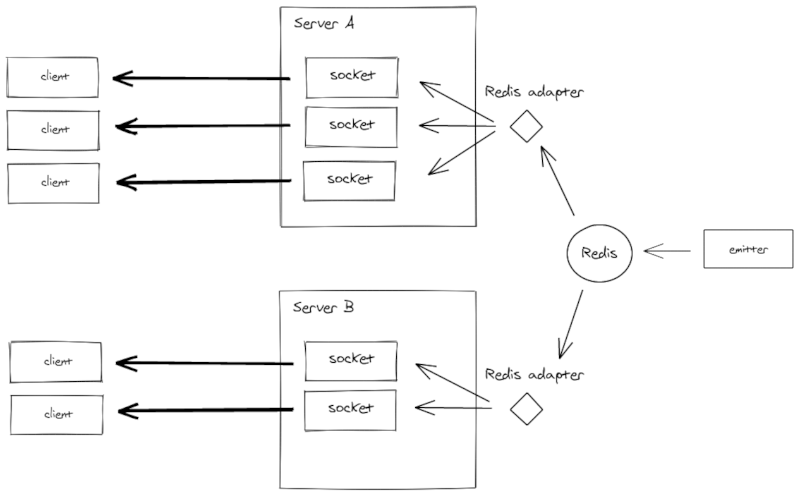1 unstable release
Uses new Rust 2024
| 0.1.0 | Mar 21, 2025 |
|---|
#11 in #send-message
114 downloads per month
27KB
302 lines
Socketioxide Emitter
🚀 Seamless communication with your Socketioxide cluster!
The Socketioxide Emitter lets you easily send messages to a group of Socketioxide servers from a separate Rust process. Designed for socketioxide-redis, this emitter is fully agnostic to the underlying system, meaning support for future adapters will be possible!
Warning
Socketioxide Emitter is not compatible with @socketio/redis-adapter
and @socketio/redis-emitter. They use completely different protocols and
cannot be used together. Do not mix socket.io JS servers with socketioxide rust servers.
If you are looking for a way to emit events to a cluster of node socket.io servers in rust,
you should use the socketio-rust-emitter package
How It Works
The emitter allows you to broadcast events to all connected servers in your cluster. It operates independently, meaning you can use it outside your main Socket.IO process to send messages, manage rooms, and disconnect sockets.

Parsers
Socketioxide Emitter supports two data encoding formats:
- Common Parser (default, widely compatible)
- MessagePack Parser (binary-optimized, efficient for large payloads)
Enable or disable them with feature flags: parser-common and parser-msgpack.
Make sure to use the same parser on the socketioxide servers and the emitter.
💡 Quick Start: Emit Cheat Sheet
Check the examples for more details.
1️⃣ Setup a Redis Connection and implement the Driver trait
use redis::{AsyncCommands, aio::MultiplexedConnection};
use socketioxide_emitter::{Driver, IoEmitter};
struct RedisConnection(MultiplexedConnection);
impl Driver for RedisConnection {
type Error = redis::RedisError;
async fn emit(&self, channel: String, data: Vec<u8>) -> Result<(), Self::Error> {
self.0.clone().publish::<_, _, redis::Value>(channel, data).await?;
Ok(())
}
}
2️⃣ Emit Messages
#[tokio::main]
async fn main() -> Result<(), Box<dyn std::error::Error>> {
let client = redis::Client::open("redis://127.0.0.1")?;
let conn = client.get_multiplexed_tokio_connection().await?;
let conn = RedisConnection(conn);
// Emit to all clients
IoEmitter::new().emit("event", "hello!", &conn).await?;
// Emit to a specific room
IoEmitter::new().to("room1").emit("event", "message", &conn).await?;
// Exclude a room
IoEmitter::new().to("room1").except("room2").emit("event", "message", &conn).await?;
// Private message to a socket ID
IoEmitter::new().to("tK3lxSproMuTbioPAAAB").emit("event", "message", &conn).await?;
// Use a namespace
let nsp = IoEmitter::new().of("/admin");
nsp.emit("event", "message", &conn).await?;
// MessagePack encoding
let msgpack = IoEmitter::new_msgpack();
msgpack.emit("event", "message", &conn).await?;
Ok(())
}
Adapter-Agnostic Design
While currently available for socketioxide-redis,
the Emitter is designed with flexibility in mind. Support for future adapters (such as Kafka, MongoDB, PostgreSQL)
is planned!
Dependencies
~2.3–3.5MB
~58K SLoC